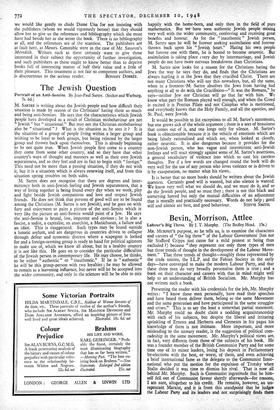The Jewish Question
M. SARTRE is writing about the Jewish people and how difficult their Situation is made by reason of the Chffstians' hating them so much and being anti-Semites. He says that the characteristics which Jewish People have developed as a result of Christian misbehaviour are not " Jewish " but " situational." But may not the Christian misbehaviour also be " situational " ? What is the situation as he sees it ? It is he situation of a group of people living within a larger group and 'wishing to be loyal to both groups, but being rejected by the larger group and thrown back upon themselves. This is already beginning o be not quite true. When Jewish people first come to a country they come from some other country, and so they have that other country's ways of thought and manners as well as their own Jewish Separateness, and so they feel and are in fact to begin with " foreign." This need not be more than a passing situation, if they do not wish it, but it is a situation which is always renewing itself, and from this situation spring troubles on both sides.
-M. Sartre does not recognise that there are degrees and inter:- mittency both in anti-Jewish feeling and Jewish separateness, that a way of living together is being found every day when we work, play and fight beside Jewish companions and love and respect Jewish friends. He does not think that persons of good will are to be found Among the Christians (M. Sartre is not Jewish), and he goes on with fury and enjoyment to paint a picture of the anti-Semite which is very like the picture an anti-Semite would paint of a Jew. He says the anti-Semite is brutal, low, impotent and envious ; he is also a fascist, a sadist, a capitalist, an anarchist, a Manichaean, a failure and an idiot. This is exaggerated. Such types may be found outside a lunatic asylum, and are dangerous in countries driven to collapse through defeat and economic distress where a scapegoat is looked for and a foreign-seeming group is ready to hand for political agitators to make use of, which we know all about, but in a healthy country it is not like this. He goes on to consider the particular difficulties of the Jewish person in contemporary life. He may choose, he thinks, to be either " authentic " or inauthentic!' .If he is " authentic " he will be this group-person with two loyalties • he may be allowed to remain as a leavening influence, but never will he be accepted into the wider community, and only in the sciences will he be able to mix
happily with the home-born, and only then in the field of pure mathematics. But we have seen authentic Jewish people mixing very well with the wider community, conferring and receiving great benefits and honour: As for the " inauthentic " Jewish person, M. Sartre says he will be forever seeking assimilation and forever thrown back upon his " Jewish heart." Hating his own people but forever one with them, he is bound to become neurotic. But assimilation is taking place c very day by intermarriage, and Jewish people do not have more nervous breakdowns than Christians.
M. Sartre now looks for a reason for the Christians hating the Jews the way he says they do, and finds that the Christians are always hurling it at the Jews that they crucified Christ. There are not many Christians who will say this nowadays, but, all the same, when in a foomote4111. Sartre absolves the Jews from having had anything at all to do, with the Crurifixion—" It was the Romans," he says—neither Jew nor Christian will go that far with him. We know what part the Romans played well enough, and when the Creed is recited it is Pontius Pilate and not Caiaphas who is mentioned, and everybody knows that the Holy Family, and all the apostles, and St. Paul, were Jewish; -
It would be possible to list exceptions to all M. Sartre's statements, but one grows sick of the whole argument ; there is a sort of brassiness that comes- out of it, and one longs only for silence. M. Sartre's book is objectionable because it is the vehicle of emotions which are being falsely rationalised and which are, when looked at closely, rather neurotic. It is also dangerous because it provides for the non-Jewish person, who has vague and intermittent anti-Jewish feelings and will react strongjy against some of M. Sartre's assertions, a general vocabulary' of violence into which to cast his careless thoughts. For if a few words are changed round the boa will do very well for the use of any person who loves violence or is driven to it by exasperation, no matter what his views..
It is better that no more books should be written about the Jewish question. Certainly good will is wanted, but also silence is wanted.
We know very well what we should do, and we must do it, and so do the Jewish people, and so must they • there is not this black and unvarying hatred but only the mutual difficulties of an adjustment that is morally and practically necessary. Words do not help ; good will and silence are best, and good behaviour. STEVIE SMITH.














































 Previous page
Previous page